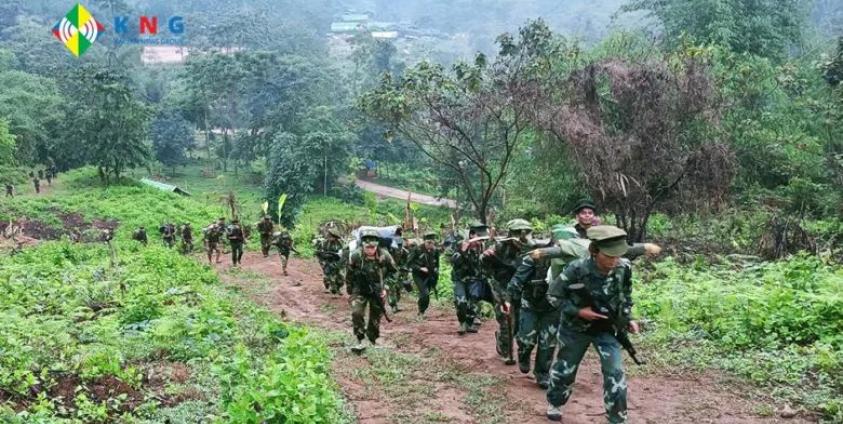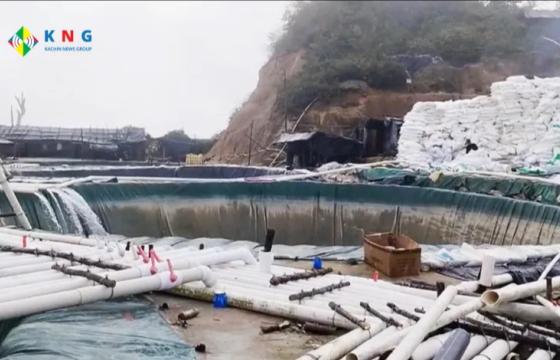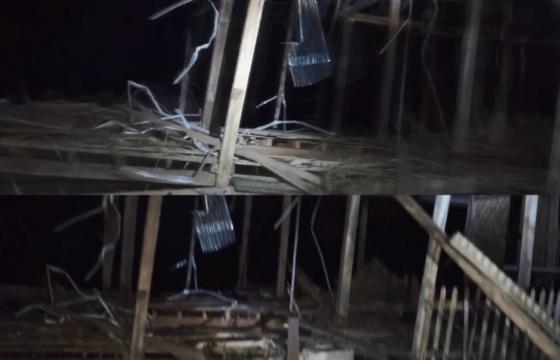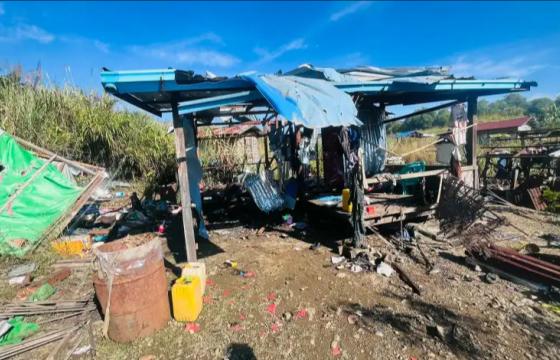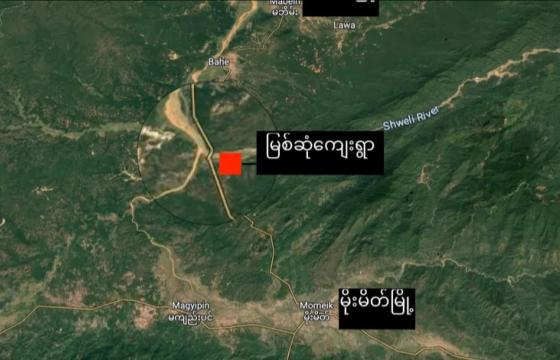After the military council activated the National Conscription Law on 10 February 2024, some Kachin youth have attempted to go abroad while others are considering joining resistance groups.
At the same time, some resistance groups in Kachin State have responded by releasing statements inviting youth to join them in armed struggle.
Civil war has occurred in Burma for more than seven decades, and during that time Ethnic Armed Organizations (EAOs) have recruited new soldiers by various methods. After the military coup in 2021, military coup activates the national conscription law this year.
What is the National Conscription Law?
The National Conscription Law activated by military council chair Min Aung Hlaing on 10 February 2024 has its origins in the previous military government headed by dictator U Than Shwe.
According to the National Conscription Law, men aged between 18 and 35 must serve in the army. Men with professional credentials must serve in the army up to the age of 45. Women aged between 18 and 27 must serve in the army. Women with professional credentials must serve in the army up to the age of 35.
In order to implement the National Conscription Law, on 13 February the military council formed a Central Recruitment Team.
The military council’s Information Department reported that the National Conscription Law would start full implementation this April. They said they would start the first batch of military training with 5,000 cadets, with a plan to recruit 60,000 new soldiers per year. Also on 13 February, the military council activated the Military Reserve Law to recall former soldiers to military service.
Ethnic Armed Organization’s military service laws and recruitment methods
Kachin Independence Army
The Kachin Independence Army (KIA), which has joined armed struggles for more than 60 years, has not officially announced a law regarding military service and recruitment. In practice, the KIA has recruited a person each from each Kachin family. The KIA has also recruited new soldiers from different areas by using different methods.
After the launch of the 1027 Operation in northern Shan State, the KIA’s southern military command, which is based in northern Shan State, released an official statement that offered the opportunity for Kachin youths to join armed struggle.
On the 63rd anniversary of Kachin Revolution Day on 5 February, General N’ban La, who is the Chair of the Kachin Independence Organization (KIO), said that “this is the last change for all of us. Therefore, all people need to join the revolution. When we look back at history, youth have played a crucial role in political changes. So we would like to offer all healthy youth to join the KIA and armed struggle.”
Even though the KIA hasn’t announced its new soldier recruitment policy officially, many people criticized KIA for conducting forced recruitment.
“The KIA has recruited a person from each family in villages, but not always in urban areas. Sometimes the KIA conducted forced recruitment for its army. Generally, we can say that people do not join the KIA voluntarily. The KIA has conducted forced recruitment for 99% of its soldiers. Even though parents support KIA, they don’t like their children to join the KIA,” a Kachin political analyst told KNG.
The Kachin political analyst concluded that “sometimes youth voluntarily join the KIA but they are so disappointed with KIA when they arrive in KIA’s territory. In my opinion, KIA needs to change some leaders.”
Ta’ang National Liberation Army
The Ta’ang National Liberation Army (TNLA), which is based in northern Shan State, has announced its military service law on 4 February 2024.
According to the TNLA’s military service law, all Ta’ang youths above the age of 16 can voluntarily join the TNLA. If a family has two sons who are aged between 18 and 35, one of them must serve in the TNLA.
There are exceptions in the TNLA’s military service law for sons who take religious roles or who have disabilities. If a family has two sons aged between 18 and 35 but one of them has been a monk or a novice monk in the three years before the announcement of TNLA’s military serving law, then the remaining son is permitted to not serve in the TNLA. If one of the two sons are disabled or mentally ill, then the remaining son is exempt from serving in TNLA.
Myanmar National Democratic Alliance Army
The Myanmar National Democratic Alliance Army (MNDAA), which is also known as Kokang army, has not officially announced its recruitment policy or military service law. Local people told KNG that in practice the MNDAA orders people who are aged 16 and above must serve in the MNDAA.
On 16 February, the World Kachin Congress (WKC) released a statement demanding that both the TNLA and the MNDAA not recruit youths aged under 18.
Which side will get benefits from activation of the national conscription law?
An officer working with the Northern Burma People’s Defense Force (NBPDF), based in Myitkyina town, said that some youth called them for joining armed struggle two weeks after the announcement of the military council’s National Conscription Law.
“The number of youth joining has increased by around 20% since the junta announced the conscription law. In Sagaing Region, many people have joined the armed struggle. We welcome everyone but we double check their background because we are worried that informers will come to our area. If people contact us, we will send them to EAO’s territory. We welcome all youths to join us,” the NBPDF officer told KNG.
A Kachin youth who lives in Myitkyina town said that he would join the KIA if the Burma army starts to forcibly recruit people from their homes.
“We are worried that the military council will arrest people at their homes. If I need to join the KIA it will be difficult because my parents are old and they depend on me, but I will do it. I feel that in the current situation it is like our legs are broken,” the Kachin youth told KNG.
Political analysts have said that they don’t exactly know what will happen in Kachin State related to the National Conscription Law because the military council ally the People’s Militia Force (PMF) was so strong in Kachin State.
“After the activation of the National Conscription Law, they can officially arrest people and use them as porters. I think clashes will escalate between resistance groups and the Burma army in the future. Armed conflicts will increase in our country. It’s not an easy task to cut off the root of military dictatorship in this country. I do believe that we will achieve our goal one day because all people are trying their best to defeat the military dictatorship,” Ma Ja Ein, spokesperson for the Thailand-based Kachin Women Association of Thailand (KWAT), told KNG.
“All people including youth do not like the military council. So I think many youths will join EAOs, and they will increase their strength. It’s a positive thing. From the negative point of view, youth will lose their opportunity for education. I do not know how long this revolution will be. Probably, youth will become depressed. In my opinion, this is the last battle. So youth need to make the correct decision. Everybody needs to participate in this revolution against military dictatorship,” another Kachin political analyst, who lives in Myitkyina, told KNG.
The Kachin political analyst said that if respective EAO officials prepare leadership roles in line with human rights, youths will come to join the revolution.
A Kachin youth, who lives in northern Shan State and already joined the armed struggle, said that the military council’s National Conscription Law only covers the territory under their control. The law won’t be effective in EAO-controlled territory and won’t affect youth who go abroad.
“After Three Brotherhood Alliance launched the 1027 Operation in northern Shan State, no Burma army remained in our area. Our area is already liberated. EAOs have authority in our area. The military council’s National Conscription Law is not effective in this area. I think about 40% of youth have already joined the revolution. About 30% of youth are studying. And the remaining 30% of youth are laborers. In the past, many youths went to work in Laukkai. Now these youth laborers go to work in Ruili town of Yunnan Province in China. If the ceasefire agreement is broken, these youths will join the EAOs and armed struggle. We are trying to make sure that the revolutionary struggle ends with this generation. Avoiding it won’t allow you to escape from this struggle, so we have to carry on,” the Kachin youth told KNG.
Youth who are living in EAO-controlled territory will escape from the military council’s National Conscription Law but they will have to follow the EAO’s military service law. Some youth who don’t want to join resistance groups will go abroad and some youth will continue their education.
Many young people have decided to try to travel to Thailand and tried to get travel visas from the Thai embassy in Yangon. On 16 February, the Thai embassy in Yangon announced that the embassy would only issue visas for 400 people per day and that visa applicants must get their queue number online.
Many people have also attempted to enter Thailand through land border routes without any travel visa. Many people were arrested by Thai police for illegal entry.
A local man, who helps people cross the Tachileik – Mae Sai border, said that many people have attempted to travel to Thailand recently. In response authorities from both countries are now strictly inspecting travelers at border checkpoints.


